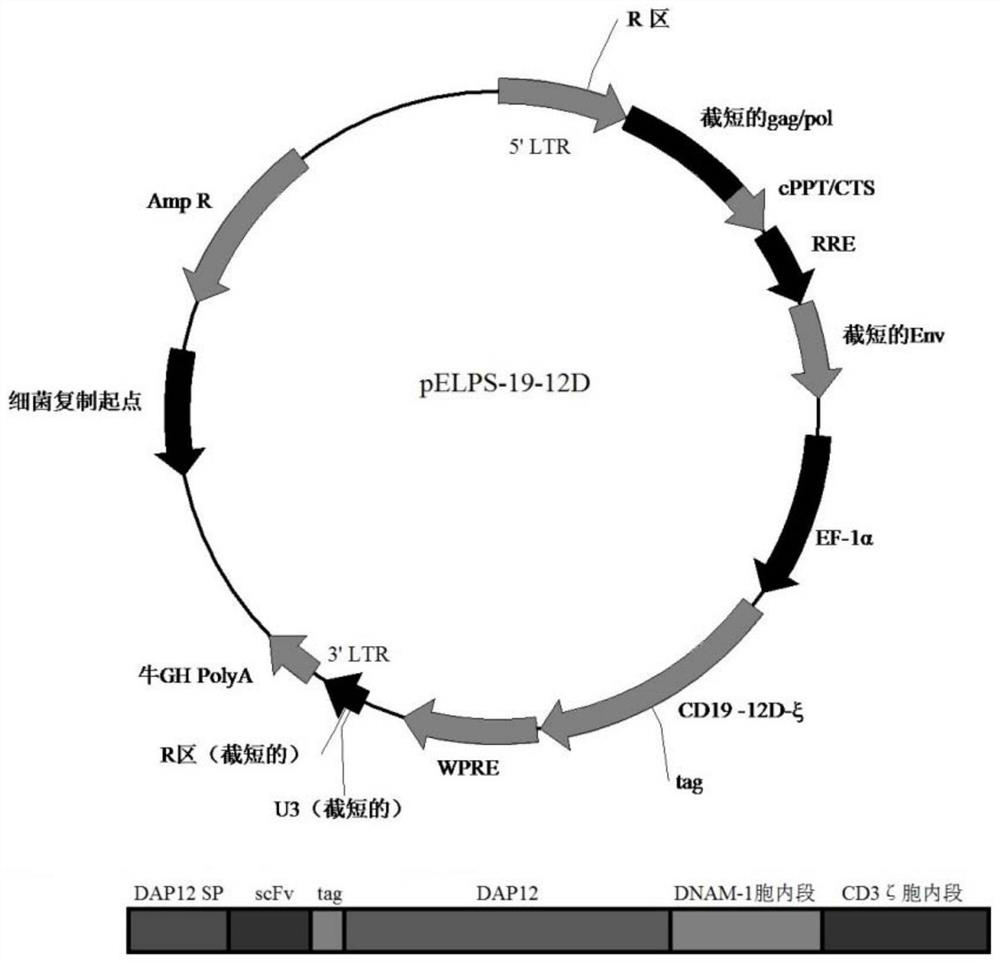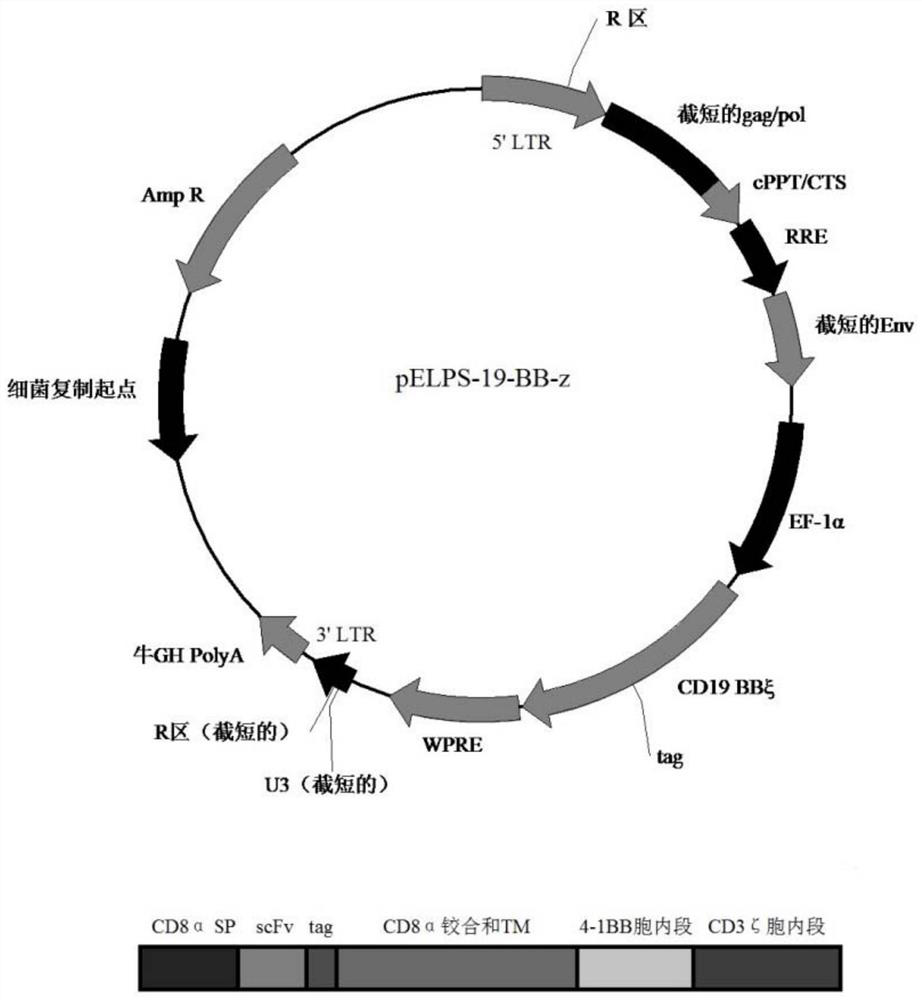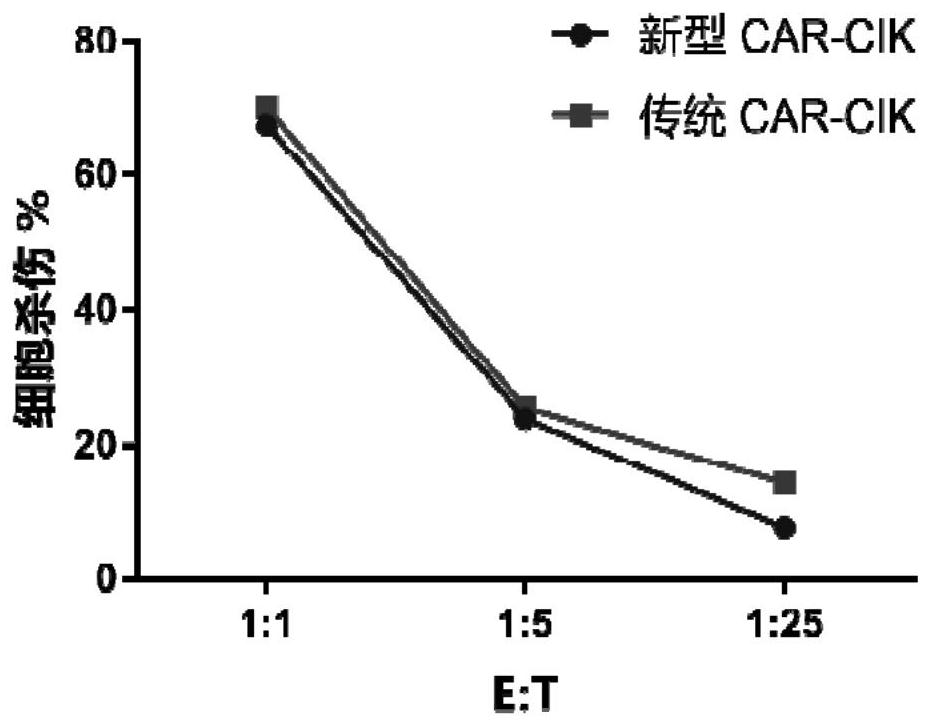A kind of chimeric antigen receptor car of cik cell and its application
A cell and antigen technology, applied to receptors/cell surface antigens/cell surface determinants, for targeting specific cell fusion, application, etc., can solve problems such as death, unknown CIK, weakened anti-tumor function, etc., to achieve The effect of reducing storm and improving safety
- Summary
- Abstract
- Description
- Claims
- Application Information
AI Technical Summary
Problems solved by technology
Method used
Image
Examples
Embodiment 1
[0051] Example 1. Packaging and purification of lentivirus
[0052] Will figure 2 The lentiviral vector pELPS-19-BB-z (named CAR-CK, the structure is SP-scFv-tag-CD8α-4-1BB-CD3ζ, i.e. CD19BBζ located downstream of the EF1α promoter) is shown. The CAR in the patent 2017108531905) was replaced with 7 different new CAR structures (CAR-1 to CAR-7) shown in Table 1, and 7 different recombinant lentiviral vectors were obtained, among which, figure 1 Shown is a recombinant lentiviral vector containing CAR-7 (structure SP-scFv-tag-DAP12-DNAM-1(CD226)-CD3ζ, CD19-12D-ζ located downstream of the EF1α promoter).
[0053] The above-mentioned eight different recombinant lentiviral vectors were separately packaged and purified according to the following methods to obtain eight different lentiviruses:
[0054] 1. Take a 10cm petri dish as an example, inoculate HEK293T cells in DMEM medium containing 10% fetal bovine serum; when they grow to a confluence of 70-80%, start packaging the virus...
Embodiment 2
[0066] Example 2. Acquisition of CAR-CIK cells
[0067] First, the acquisition of CIK cells
[0068] 1. Mononuclear cells were collected from peripheral blood, umbilical cord blood, and bone marrow by density gradient centrifugation;
[0069] 2. Press 2×10 6 / ml, cells were seeded in X-VIVO 15 medium containing 1000U / ml IFN-γ;
[0070] 3. After 24h, add OKT-3 and IL-2 to make the concentration reach 50-100ng / ml and 300-1000U / ml respectively;
[0071] 4. After every 2-3 days, half-change the medium and add X-VIVO 15 medium containing 300-500U / ml IL-2;
[0072] 5. On days 3-7, after the subpopulation of CIK cells reaches the doubling growth stage, cell transfection is started.
[0073] 2. Lentiviruses loaded with CAR gene were transfected into subpopulations of CIK cells
[0074] 1. Change the medium and adjust the cell density to 0.1-1×10 6 / ml;
[0075] 2. According to MOI=5-10, add eight different lentiviruses obtained in Example 1, and resuspend the supernatant;
[0...
Embodiment 3
[0083] Example 3. Killing of Raji cell lines by different CAR-CIK cells
[0084] The eight kinds of CAR-CIK cells obtained in Example 2 were respectively mixed and cultured with target cells-Raji cells (human lymphoma cells) at 1:1, 1:5, 1:25 (effect-target ratio E:T) for 24h, CIK cells without lentivirus transfection were set as the control group, and the luciferase quantitative killing efficiency evaluation method was used to detect the inhibitory and killing ability of CAR-CIK on target cells; among them, the results of CAR-7-CIK are shown in image 3 ; When E:T is 1:1, 1:5, the new CAR-CIK represented by CAR-7-CIK and traditional CAR-CIK have no significant difference in killing target cells, CAR-1-CIK, CAR-CIK The results of 2-CIK, CAR-3-CIK, CAR-4-CIK, CAR-5-CIK, CAR-6-CIK were not significantly different from those of CAR-7-CIK.
[0085] The cell supernatant of the 1:1 group E:T was collected, and the release levels of cytokines such as IFN-γ and IL-6 were detected by ...
PUM
 Login to View More
Login to View More Abstract
Description
Claims
Application Information
 Login to View More
Login to View More - R&D
- Intellectual Property
- Life Sciences
- Materials
- Tech Scout
- Unparalleled Data Quality
- Higher Quality Content
- 60% Fewer Hallucinations
Browse by: Latest US Patents, China's latest patents, Technical Efficacy Thesaurus, Application Domain, Technology Topic, Popular Technical Reports.
© 2025 PatSnap. All rights reserved.Legal|Privacy policy|Modern Slavery Act Transparency Statement|Sitemap|About US| Contact US: help@patsnap.com



